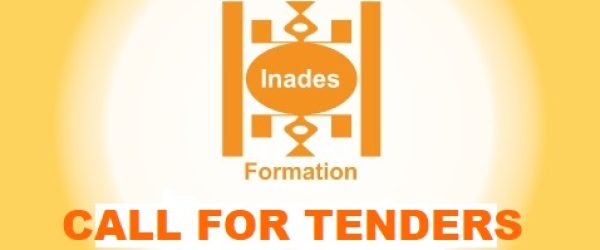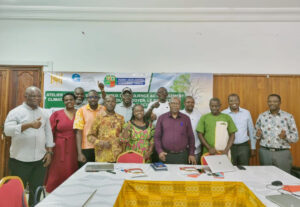Terms of Reference for developing a mobile application for Distance Learning Program
(Correspondence Courses)
which is offered by Inades-Formation Tanzania
November 2022
Download the call of tenders notice here
1.0 Background
Inades-Formation Tanzania is a not-for-profit, non-governmental organization (NGO) established in 1989. Inades-Formation Tanzania’s ambition is to contribute to the social and economic advancement of the people, with special emphasis on free and responsible participation in the transformation of their societies. It’s stated development approach is through stimulation and supporting a socio-economic change process co-initiated with rural people which is owned and controlled by them as primary stakeholders. It complied with the Non-Governmental Organization Policy and Act of 2002 and received a certificate of registration No 0448 of 08 February 2022 valid for 10 years up to 07 February 2032 which was issued by the registrar for Non-Government Organizations under the Ministry of health, community development, gender, elderly and children. Inades-Formation Tanzania values are: Honesty and Integrity; Solidarity and Cooperation; Voluntarism; Transparency and Openness; Accountability; and Flexibility.
IFTz offers a non-formal/distance learning education through Correspondence Courses-CC (among other programs) to interested trainees (individuals and grouped farmers, extension and rural development workers) from all over Tanzania whereby transmission of information, knowledge & know-how to the public is at a relatively lower cost. It has 2 main advantages: It enables trainee(s) to learn without abandoning their work environment, and apply the knowledge directly to their livelihood engagements, and it offers more flexibility than formal training in terms of time of enrolment and completion, study pace, and choice of courses, course materials and costs.
Inades-Formation Tanzania with support from Bread for the World (BftW) intends to implement a new mobile application that will offer training materials and booklets in digital format directly at the customer’s phone. This intends to improve the existing training process and material sharing that is currently operating at Inades-Formation Tanzania office. As part of an automation project, the mobile application will eliminate labour-intensive duties that involve repetitive physical trainings, supervision and data analysis of the training’s effectiveness.
1.1 Distance Learning Program (Correspondence Courses) Digitalization Agenda
Inades-Formation Tanzania offers different training materials in form of booklets and physical trainings to different stakeholders (key being farmers, poor and disadvantaged communities). Preparing and developing such materials have a high cost from printing, storage, transportation and replacement. To address this challenge, Inades-Formation is aiming to digitalize the distribution process of the materials by making them available in a mobile application. A stakeholder member or group of members will be able to subscribe to a training material, read and store it directly on their devices for future reference. With this approach, we aim to increase accessibility to our training materials but also gather data that will help us enhance our services based on stakeholder’s preference and feedbacks.
Advantages of the proposed system
- Improve data quality due to accurate and timely information in digitalized format.
- Increase operational efficiency.
- Real time data that enables to understand training progress to appropriate person.
- Data accessibility; data is available and accessible at any time to appropriate person.
- Lower costs (removing printing cost, storage cost (cabinets), time cost (through unnecessary tasks such as training) as well as transport and postage costs.
- Security through reliable data access restrictions.
2.0 General Objective
The main objective of establishing mobile app and reporting dashboard is to foster the efforts of the institution to digitalize and sharing training materials through distance learning in correspondence courses that aimed at providing knowledge, increase efficiency and skills performance of the leaders of people, projects or institutions of a particular topic of interest of the reader by offering effective and accessible materials directly from mobile devices while reducing existing constrains. These constrains include physical registrations of the applicants, material and assignment accessibility, track progress of the subscribers and interaction with the readers, time used in marking, increase in training material production cost, follow up and back up information, lack of access of materials digitally to users etc. Therefore, the App should enable the subscribers to know course provisions and course contents (booklets), program objectives and its clients, application and registration and easy program assessments (exams) earn digital certificates, reports and feedback.
2.1 Specific Objectives
- To develop a mobile application and web database for Inades-Formation Tanzania.
- To support the installation and configuration of the application to respective deployment environments.
- To provide technical after-sale support for a minimum of 3 months into the implementation phase.
2.2 Specifications and requirements of the assignment
Inades-Formation Tanzania expects consultant to develop a mobile application with the following minimum features:
- Real time mobile application system that allows multiple stakeholders to access based on subscription. The application should allow subscriber to download the training material onto their devices so they can access at any time.
- Web dashboard connector that allows Inades-Formation Tanzania to upload, update and store training materials that will be accessed by the stakeholders.
- Payment integration with payment aggregators to allow direct payment for subscribers.
- Report generation facility that is the software must be able to produce statistical reports such as, but not limited to the following:
- Real time reports – to monitor performance per subscriber and per group while handling other functions.
- Historical reports – to be used as basis for monitoring subscribers and groups performance on a daily, weekly and annual basis showing details.
2.3 Technical Support
The provider shall assign a contact person who will technically support Inades-Formation Tanzania for a period of 3 months after deployment whenever necessary.
2.4 Training
The provider shall train the Inades-Formation Tanzania personnel after installation of the software solution.
3.0 Timeframe
The duration of the assignment is expected to be 40 working days, which includes development of mobile application and web database, installation and training of key personnel. The provider will be required to provide weekly progress updates to the project manager, ICT officer and Senior Management Team of Inades Formation. The provider will submit a comprehensive report of the assignment immediately after completion of the assignment and final report of the activity after the 3-month after-sale support period.
S/N | Activity | Time frame | Days | Responsible | |
1 | Introductory meeting with Inades-Formation Tanzania share inception report, agree and sign service agreement | 21st–22nd 2022 | November | 2 | Inades-Formation Tanzania team and consultant |
2 | Sharing and reviewing of existing processes and documents of the course. | 23rd–24th 2022 | November | 2 | Inades-Formation Tanzania team and consultant |
3 | Drafting and Submission of System Requirement Specifications (SRS) Document | 26th-27th 2022 | November | 2 | Consultant |
4 | Design of Application Process Flow, System Architecture and Database, User Interface Screens | 28th–30th 2022 | November | 3 | Consultant |
5 | 1st stage and 2nd stage of programming, coding and user interface design | 1st- 23rd 2022 | December | 23 | Consultant |
6 | System Test Plan | 24th December 2022 | 1 | Consultant | |
7 | User Acceptance Report and Final System | 25th – 26th December 2022 | 2 | Inades-Formation Tanzania team and consultant | |
8 | Writing System Technical Documentation & Training Manuals | 27th December 2022 | 1 | Consultant | |
9 | Conduct Training to end users and administrators | 28th – 29th December 2022 | 2 | Inades-Formation Tanzania team and consultant | |
10 | System Installation, piloting and Go Live | 30th – 31st December 2022 | 2 | Consultant | |
4.0 Specific Instructions
Inades-Formation Tanzania invites submission of bidding documents for the development of a mobile application and web database that offers training materials to farmers and other stakeholders.
5.0 Eligibility:
Any Company/Firm that submits a proposal should be able to provide the following:
- Corporate registration certificate.
- Business license.
- Tax clearance or proof of exemption by the tax authority.
- Verifiable track record of provision of such services /solutions.
Documents to be submitted (apart from the above)
- Part A: Technical Proposal
- Part B: Financial proposal
6.0 Evaluation criteria
i. Quality of the technical proposal
- Technical soundness of the proposed solution
- Specificity and practicability of the proposed execution plan
- Proposed Technical back-up
- Previous relevant experience supported by proven track record in respect to required services in the TORs
- Return on Investment/Value proposition
i. Capacity to deliver the proposed solution (quality of the team)
iii. Financial proposal
The proposed budget will be evaluated based on technical and market logic presented. Budgeting should be presented not in number of days but in deliverables per milestones as aligned to the 3 objectives.
6.1 The evaluation process has 3 phases:
Phase 1: The proposals will be reviewed for compliance i.e. if all required documents on the checklist have been submitted. Only those meeting minimum requirements will proceed to the next phase.
Phase 2: Technical presentations and assessment based on the submitted proposals/documentation.
Phase 3: Based on the final ratings, the company/firm with the highest rating will be visited for verification and contract negotiation.
6.2 Submission Requirements
- Technical proposal should not exceed 5 pages excluding the cover page.
- Budget to undertake the assignment. Clearly indicate cost required to develop the software, training and after-sale support. Note that the budget should not include ICT equipment/hardware as that will be required to be purchased by Inades-Formation if any.
- Customized company profile related to this task should not exceed 5 pages.
- List of assigned staff as follows:
- Project manager
- Technical contact, and;
- Finance contact.
- Scanned copies of registrations, business license and tax clearance/exemption with national authorities.
7.0 Application
Interested and qualified consultants are invited to send in their expression of interest (EOI) with a technical and financial proposal (include number of days, rate per day and other resources required for the consulting team), and detailed CV by Thursday, 17.11.2022. The technical proposal should include a concrete guideline, with questions designed in view of achieving the above objectives. EOI shall be submitted to the Managing Director through the following email address; inadesformation.tanzania@inadesfo.net and a copy inadestz@gmail.com.










